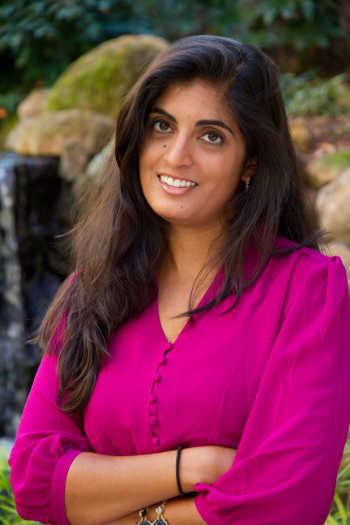
CLEARLAKE, Calif. – With February set aside as a time to commemorate American Heart Month, a new county cardiologist will host a Wednesday evening discussion on how women can have healthier hearts.
Dr. Monica Divakaruni will give the free lecture on basic lifestyle changes that can prevent disease and improve quality of life and health for women from 5:30 p.m. to 6:30 p.m. at St. Helena Hospital Clear Lake's Live Well Clinic, 15230 Lakeshore Drive, Clearlake.
Divakaruni, a leading interventional cardiologist trained at Stanford University, recently joined St. Helena Hospital Clear Lake's staff, as Lake County News has reported.
She's a member of the Adventist Heart Institute, which is composed of experienced cardiologists and cardiovascular surgeons who serve patients in Lake, Napa and Mendocino counties.
Cardiovascular health is a particular health concern in Lake County, according to available health data.
Statistics from California's Office of Statewide Health Planning and Development show that Lake County has a 12.4 percent unadjusted rate for diagnosed heart disease, the highest in the state. Similarly the county has the highest rate of hypertension in the state at 37.3 percent, with Clearlake alone reported to have a rate of hospitalizations due to heart attack that is five times the state average.
The state's most recent county health status rankings place Lake near the bottom – at No. 51 – out of California's 58 counties for its death rate for coronary heart disease, a problem that county health officials have attributed, in part, to the high local smoking rates.
There is increasing impetus on raising awareness not just of heart disease but of its impact on women, many of whom don't think of it as a serious potential health risk.
The American Heart Association said only one in five American women believe that heart disease is her greatest health threat, yet it's the No. 1 killer of women, causing one in three deaths annually – making it deadlier for women than all causes of cancer combined.
Dr. Divakaruni, who has a particular passion for women’s cardiovascular health, said that from 1988 to 2004 the rates of heart attacks in women increased.
The study that reported that increase suggested that the rise in female heart attack cases was related to better risk factor control in men than women. As a result, she said heart disease in women should be getting more notice.
There also has been a steady rise in heart disease rates in younger women – in the 35 to 45 age group – over the last decade, she said.
Women in certain ethnic groups are hit especially hard by heart disease.
Health data from the American Heart Association shows that cardiovascular disease is the leading cause of death for African American women, with 46.9 percent of African American women age 20 and older suffering from it.
Hispanic women similarly are at higher risk, with the disease also being their No. 1 cause of death, and a condition they're likely to develop a decade earlier than Caucasian women, the American Heart Association reported.
However, studies have shown that Hispanic women are more likely to take preventive actions for their family when it comes to heart health.
An American Heart Association report released last week showed that women’s heart disease awareness is increasing.
The number of women who know that heart disease is their leading cause of death has nearly doubled in the last 15 years, the report showed. However, there is still more to be done.
Understanding causes; taking simple steps
Finding a root cause for heart disease is a complicated issue.
Divakaruni said that among the “usual suspects” – smoking, diabetes, high blood pressure and high cholesterol – there is no one particular risk factor that makes women more unhealthy. Rather, it's the conglomerate of them all.
“In my experience, the biggest obstacle is that women, as mothers, heads of their households, workers, and in many other roles, have more difficulty taking time for themselves than others. In a broad general sweep, women are busy caring for others, and more and more, their own health suffers,” she said.
There also probably is still an unconscious bias amongst health care providers, some of whom still look at women as having a lower risk for heart disease, she suggested.
Social class also is believed to have an impact, with factors related to low socioeconomic status – which doctors don't completely understand – probably adding to overall heart disease risk, she said.
At her Wednesday talk, Divakaruni plans to offer guidance on simple lifestyle changes that can prevent heart disease and improve overall cardiovascular health for women.
Some of the basic steps include taking proactive control by knowing your numbers – including blood pressure and cholesterol – and asking your doctor if the numbers are within range.
Then there is the matter of nutrition. She said your mother was right – it's important to eat fruits and vegetables.
“The heart is the most important muscle in the body. But the most important part of your heart is probably what you put on your plate,” she said.
Next, get moving. Divakaruni suggested that 30 minutes a day of physical activity is best, but it doesn't need to be continuous.
“Park farther from the store. Take the stairs. Walk the dog one extra lap around the neighborhood. Little bits add up,” she said.
And just how resilient is the human heart?
“More than you might think,” said Divakaruni.
She said doctors don't yet know how to completely reverse all forms of heart disease, “but even if you've lived the most unhealthy lifestyle, your heart is resilient enough to keep you healthy if you change your habits.”
To RSVP for Divakaruni's lecture or to request a consultation call 707-995-3764.
Email Elizabeth Larson at This email address is being protected from spambots. You need JavaScript enabled to view it. . Follow her on Twitter, @ERLarson, or Lake County News, @LakeCoNews.










